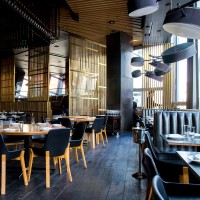VEEN Scene Round-UpVEEN Scene 013
How Restaurants Can Thrive in the Next Normal
COVID-19 has not only been a devastating public health crisis, but it has also been the restaurant industry’s greatest challenge to date. Never before have so many restaurants been forced to cease operations – and some will never reopen. Whereas pizza chains have maintained or increased sales during the pandemic, casual-dining and fine-dining restaurants have seen their revenues decline by as much as 85 percent. McKinsey report suggests that each restaurant’s performance during the crisis has depended largely on the following factors: (1) off-premise versus on-premise sales mix; (2) reliance on day-part occasions; (3) urbanicity – as restaurants in densely populated states experienced the highest traffic declines. The report outlines next steps for restauranteurs, ranging from the need to rethink the restaurant design, to optimizing delivery business and reinventing the menu.
Coronavirus Initiatives from Restaurants & Bars Around the World
With initiatives from soup kitchens to repurposed grocery stores and employee-relief funds, restaurateurs and bartenders have been doing everything they can to help keep their businesses open & alive. World’s 50 Best Restaurants complied a great list of initiatives through which restaurants still found ways to make their mark in the midst of a global crisis. For instance, having closed all his Washington DC and New York restaurants, chef José Andrés transformed many of them into community kitchens. Elsewhere, coalition of chefs including Eric Korn has pledged to make one million gallons of soup for the surrounding communities under the @MillionGallons initiative. In Copenhagen, the team at Relae has repurposed its Mirabelle bakery and restaurant as a grocery store selling fresh pasta, bread, pastry and cheese. Under the #KitchenQuarantine initiative, Osteria Francescana chef Massimo Bottura is keeping followers entertained with upbeat daily cooking videos and Q&As. But, it’s not just restaurants that are suffering but producers and the entire supply chain too. To support small farmers whose produce would go to waste while restaurants are closed, Berlin restaurant Ernst has created a new service selling produce boxes to locals. Whichever initiative You can support, do it locally: hotels and restaurants are a global industry, but now – more than ever – it is the time to support local.

Perhaps This Year…Spend A Week Following The 7 Steps to Finnish Happiness
In 2019, Finland was named the happiest country in the world for the second year running in the annual World Happiness Report. Earlier this year, Rachel Hosie, senior lifestyle reporter and fitness columnist for the Insider, attempted to get to the bottom of the matter. How? She did so by ‘renting’ a Finn as a happiness guide for the day, asking ten Finns on the street what their secret to happiness is, as well as following Visit Finland’s official six-step program To be happy like a Finn, including swimming in icy water and having “the space to breathe”. Ultimately, the lifestyle made Rachel feel calmer and more at peace, which in turn led to “a delightful feeling of contentedness”. How could you spend a week like Finn? Start with a good sweat in a sauna, have a walk in the forest, be brave to swim in a hole in the ice and – have space, because in the rush and crush of modern life, the rarities are what make us happy, such as space, quiet and time.
Europe & Zero Alcohol Drinks
Consumption of zero alcohol drinks (containing less than 0.5% ABV) has been rising rapidly. In 2017, it represented 3,4% of total beer volumes sold in Europe, positioning it a growing niche category. The zero alcohol market is much more developed in western Europe, accounting for 81% of total European volumes in 2018, with Germany and Spain accounting for two thirds of European volumes, followed by Italy and UK. The demand for zero alcohol drinks in Germany has moved away from drivers and is increasingly on the basis of lifestyle and health-focused demographics. Russia is the largest zero alcohol market in Eastern Europe, with 7% of total European volume – a number driven by zero alcohol beer. Poland and Ukraine are other significant markets in the region. Looking forward, Poland and the Netherlands are showing most growth, as Zenith forecasts western Europe will remain the dominant region, where consumers are more open to health and wellness messaging, and prices per liter and margins are at their highest.

Four Seasons’ Simon Casson: Hospitality Industry post COVID-19
For so many of us, travel is a necessary and rewarding part of our lives. It brings us together and connects us to the people and places around us. While travel restrictions and the resulting hotel closures have been a necessary response to protect health and safety, they have had significant impacts on our people and our business. COVID-19 has impacted the travel and hospitality industry particularly hard, and our teams have been working together to manage through the crisis and prepare for reopening and recovery. It has been amazing to see our property teams around the globe respond in this crisis with the utmost care and compassion to our guests, each other and those fighting on the frontlines. As we look ahead to the future of hospitality and travel, we are implementing full-scale enhancements to our already stringent health and safety procedures. Our goal at Four Seasons is to provide guests, residents and employees with the confidence and assurance that their health and safety is our first priority. Although face-to-face interactions may be more limited, we will remain as connected as ever to our guests.
Checking Into 2119: A Hotel Odyssey
Since its inception in 1919, Hilton has pioneered the hospitality industry, introducing concepts including air-conditioning, in-room televisions, the computerised reservation system and even the Piña Colada – all designed to provide hotel guests with the very best experience. Where will it all be in 2119? In a world of intergalactic getaways, hyper-personalised stays and 3-D printed decadent dinners. The world will have come a long way since Conrad Hilton purchased his first hotel in 1919. In 2119, Hilton sees hotels migrating to other planets and high up in the mountains to avoid encroaching seas. As we ventured into the middle of unexplored, previously uninhabitable deserts and created places of beauty and recreation, blank spaces morphed into hyper-personalised places, and insect protein and lab-grown meat started dominating restaurant menus.

Train-turned-hotel to open in South Africa’s Kruger National Park
Having become a leading destination for travellers the world over, South Africa is well positioned to tap into the global luxury tourist market. Located in South Africa’s Kruger National Park, the Kruger Shalati Train on a Bridge is a unique luxury accommodation experience set to open in the Park. Permanently stationed on the historically-rich Selati Bridge above the Sabie River, Kruger Shalati will offer the most unique luxury accommodation in a re-envisioned train which will pay homage to the guests who explored the park nearly 100 years ago while welcoming new explorers. The train celebrates where the first visits to the iconic park were allowed in the early 1920s, the train would park overnight in the exact spot where Kruger Shalati will be positioned. Hotel’s 24 carriage rooms and 7 Bridge House rooms are glass-walled and celebrate African design through collaborations with local artists and craftspeople, and honour the natural world by way of organic furnishings, patterns and textures.
Development of Svart: the World’s First Energy-Positive Hotel
The project’s zoning planning stage has been completed. Norway’s ultra-sustainable Svart Hotel is well underway at the foot of the Svartisen glacier. Svart has four major pillars; environment, nature, sustainability and technology innovation. Wellness and mindfulness are also a big part of it. The vision for Svart is so much bigger than the project itself; we are trying to use it as a showcase of what can be achieved in terms of sustainability and energy solutions. The location could be seen as a double-edged sword – because of where it is, it must be an incredibly environmentally aware concept, and equally a project that puts questions on the map for future sustainable design, which is one of our main goals. The project came about by coincidence – the CEO of Miris was on holiday with his family several years ago and fell in love with the place. He met the person who owned the land and they got talking. The owner was trying to sell because he couldn’t develop it, and so then came the idea to actually create something ultra-sustainable as a sort of showcase; let’s really shake up the market and wake people up as to what can be done.

Harmony House India Supports Families During the COVID-19 Outbreak
Founded by Lucy Bruce and Gaurav Sinha, Harmony House India has operated as charitable organisation for street children in India since 2009. In regular circumstances, it provides education, food, health, health facilities and future employability for children and families in need. Forced to temporarily shut down due to the nation-wide lockdown caused by the COVID-19 crisis, Harmony House India still found a way to make a strong impact. The global crisis has affected millions of lives and among them are thousands of daily wage workers, laborers, street vendors and other marginalized communities of the society. These people have been forced to live without income and are struggling to make ends meet and because of this hunger has hit hard. In Gurugram, Harmony House organization has focused on feeding children, their families and the wider community, ensuring they get immediate relief-food and basic supplies. With a dedicated, selfless team working around the clock, Harmony House India has reached hundreds of families through their donation drives – distributing hygiene kits that will include soaps, toothbrushes and paste, sanitary pads, washing powder, utensil soaps, etc. Most of the families reached are going to need assistance even after the lockdown is lifted as they will be forced to wait a while before they get a job and their first salary. But with organisations like Harmony House continuing to support their children and the wider community during these uncertain times – better times are indeed on the horizon!
Harmony House India

New Opening: Zaha Hadid-designed ME Dubai
In the heart of Dubai’s Burj Khalifa district, ME Dubai is the first and last hotel where the late Iraqi-British architect, Zaha Hadid has designed both the exterior and interiors, making it her legacy project. Hadid was famous for her futuristic architecture, characterized by curves, sharp angles and bold materials, and ME Dubai is no exception. During the day, the building is a luminous surface, reflecting the Dubai sun, while come evening, LED lighting highlights its vivid character. The property also features signature furniture throughout the lobby, lounges and reception areas, all of which was either designed or personally selected by Zaha Hadid. The hotel features 74 guestrooms and 19 suites. Meliá Hotels International was founded in 1956 in Palma de Mallorca, Spain and is one of the world’s largest resort hotel chains. The new ME Dubai is a contemporary interpretation of the Meliá experience drawing inspiration from its chain of hotels in London, Cabo, Cancun, Barcelona, Madrid and Vienna.




